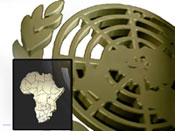
JOHANNESBURG (IPS)–South Africa is marshaling developing countries in the United Nations to try and prevent war between Iraq and the United States, rather than letting the U.S. ride roughshod over the will of the majority of members of the international organization.
South Africa is currently chair of the 115-strong Non-aligned Movement (NAM), which represents the majority of countries in the United Nations, and the African Union (AU).
South Africa has emerged as a loud critic of U.S. threats to attack Iraq.
“We have insisted that the Iraq question must be solved through the UN. The UN exists because of a global commitment to regulate the power of the powerful, in the interests of international peace and justice. This situation demands that we intensify the struggle for the strengthening of the multilateral system of governance. The UN is at the center of this system, and is the only guarantee that the voice of weak, such as ours, can be heard,” says South African President Thabo Mbeki. He was writing in a newsletter of South Africa’s ruling party, the African National Congress (ANC).
“We cannot accept that the powerful have a right to use their power either to marginalize the UN or disempower it to facilitate the pursuit of their war aims. Nor can we agree that the powerful have a right to use the authority of the UN and its prestige as a peace agency, to legitimize a pre-determined decision to wage war,” adds Pres. Mbeki.
The United States has repeatedly indicated that it is prepared to defy the UN and go to war against Iraq, without an undisputed mandate from the international community. After chief arms inspector Hans Blix presented his report to the UN on Jan. 27, South Africa backed inspectors’ called for more time to continue their investigations in Iraq.
Greg Mills, the director of the South African Institute of International Affairs (SAIIA), points out that South Africa is determined to strengthen the UN–in an attempt to improve global governance in favor of developing countries.
Mr. Mills points out that as one of the few countries to have destroyed its nuclear arsenal to the satisfaction of the UN, South Africa has a huge amount of credibility in the international community on questions of disarmament–and this can be used to help Iraq assure that it has destroyed its weapons of mass destruction.
Ironically, Mr. Blix, among others, have described South Africa as an example of how Iraq should cooperate with the international inspectors during the search for weapons of mass destruction, if it wants to prevent a war. A decade ago, South Africa became the first country to destroy its stockpile of nuclear weapons.
The South African government is also backing a peace mission by representatives of the country’s civil society, Roelf Meyer and Laurie Nathan, to “determine the role of civil society, both globally and nationally, to help find a peaceful resolution of the Iraqi situation within the multilateral global system of governance and the UN.”
Presently, the two are in Iraq, where they have met with Iraqi Deputy Prime Minister Tariq Aziz.
South African cabinet ministers have also regularly been visiting Iraq–throughout the present crises–to urge it to cooperate with UN efforts to prevent a war, while insisting the United States must show restraint. However, Mr. Mills doubts that South Africa’s international political credibility will translate into enough political weight to deter the United States from going to war.
He argues that the United States may not see South Africa as an honest broker–because of the African country’s regular contact with Iraq and its anti-war rhetoric. South Africa is worried that the international economic fall-out from a war with Iraq, which has the world’s second largest oil reserves, will damage the country’s and the continent’s economy.
Pres. Mbeki, commented: “The inevitable sharp increase in oil prices and other negative economic consequences would condemn the African continent to a deep economic crisis. It would put paid to all the high hopes raised by the New Partnership for Africa’s Development (NEPAD) initiative and the formation of the African Union. Instead, the peoples of Africa would have to confront the reality of even further impoverishment.”
NEPAD is a program aimed at kick-starting the economic and social development of Africa.












